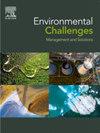由于气候和非气候压力因素以及沿海社区居民的福祉,水产养殖相关生计发生了变化
Q2 Environmental Science
引用次数: 0
摘要
本研究旨在分析过去57年来泰国曼谷Bang Khun Thian地区沿海社区环境变化对水产养殖相关生计的影响。此外,该研究还试图评估目前居住在这些沿海社区的居民的福祉及其重要决定因素。这项研究采用了多种方法。对6位社区领导人和12位居民进行了深度访谈,并进行了文献综述,以分析与水产养殖相关的生计变化过程。随后于2024年7月对177名居民进行问卷调查。在文献回顾和深度访谈的基础上进行了时间顺序分析,以检查从1967年到现在(2024年)的生计战略随时间的变化。采用多元logistic回归分析,检验居民幸福感与生计相关变量、社会人口特征和个人对不良事件的适应能力等相关因素之间的关系。结果表明,由于环境质量的变化(如水资源污染、土壤污染、入侵物种的引入和红树林的消失)和环境灾害(如强降雨、高水温、海平面上升和土地侵蚀)的发生,社区自然资产恶化。一些家庭将其生计战略从纯水产养殖转向部分水产养殖或非水产养殖。一些家庭通过在水产养殖实践中采取适应策略来维持纯粹的水产养殖生计,但在应对环境危害方面基本上不成功。多元logistic回归分析结果显示,单纯水产养殖生计的居民更有可能经历低水平的幸福感。此外,低幸福感还与较大的家庭规模、较低的家庭收入以及较低的金融、环境和社会抵御不良冲击的能力有关。因此,可以认为,在该地区的环境危机中,生计多样化对纯渔业家庭,特别是家庭规模较大的家庭至关重要。还应促进金融、社会和环境恢复力的建设,以提高居民的福祉。本文章由计算机程序翻译,如有差异,请以英文原文为准。

Aquaculture-related livelihood changes due to climate and non-climate stressors and well-being of residents in coastal communities
This study aimed to analyze the changes in aquaculture-related livelihoods due to environmental changes that have occurred over the past 57 years in the coastal communities of Bang Khun Thian District, Bangkok, Thailand. Additionally, the study sought to evaluate the well-being of residents currently residing in these coastal communities and its significant determinants. The study employed mixed methods. In-depth interviews with six community leaders and twelve residents, along with documentary reviews, were conducted to analyze the process of aquaculture-related livelihood changes. Subsequently, questionnaire surveys with 177 residents were administered in July 2024. Chronological analysis based on documentary reviews and in-depth interviews was conducted to examine changes in livelihood strategies over time, from 1967 to the present (2024). Multiple logistic regression analyses were performed to test the association between residents’ well-being and relevant factors, including livelihood-related variables, socio-demographic characteristics, and individual resilience to undesirable events. The results demonstrated that, due to changes in environmental quality (e.g., contaminated water resources, soil pollution, the introduction of invasive species, and loss of mangrove forests) and the occurrence of environmental hazards (e.g., heavy rainfall, high water temperatures, sea-level rise, and land erosion), communities’ natural assets deteriorated. Several households shifted their livelihood strategies from pure aquaculture to partial aquaculture or non-aquaculture livelihoods. Some households maintained pure aquaculture livelihoods by adopting adaptation strategies in aquaculture practices but were largely unsuccessful in coping with environmental hazards. The results of the multiple logistic regression analysis revealed that residents with pure aquaculture livelihoods were more likely to experience low levels of well-being. Furthermore, low well-being was also associated with larger family sizes, low household incomes, and low levels of financial, environmental, and social resilience to undesirable shocks. Therefore, it could be suggested that, amid environmental crises in the area, livelihood diversification is essential for pure-fishery households, particularly those with larger family sizes. Building financial, social, and environmental resilience should also be promoted to enhance residents’ well-being.
求助全文
通过发布文献求助,成功后即可免费获取论文全文。
去求助
来源期刊

Environmental Challenges
Environmental Science-Environmental Engineering
CiteScore
8.00
自引率
0.00%
发文量
249
审稿时长
8 weeks
 求助内容:
求助内容: 应助结果提醒方式:
应助结果提醒方式:


